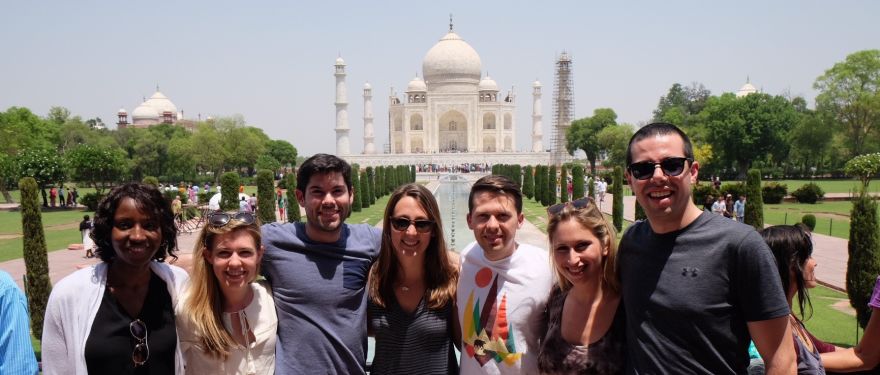The FIELD Global Immersion (FGI) is a semester-long first-year (RC) MBA course. The course is a capstone of sorts, and it requires students to build on learnings from their first-year courses and apply them to real-world business problems. At the beginning of the semester students are paired with a Global Partner (GP) company in one of 16 cities that has a product or service challenge they would like the team to address with their local consumers.
The course culminates in a one-week Immersion at the end of the semester, at which time students travel to their assigned Immersion location and meet in person with their GP and local consumers. To maximize the experience, students are asked to travel to a city and country in which they have no significant prior work, travel or life experience.
See members of the Class of 2020 find out where they’re going on their Global Immersions!What do you hope that students take away from this program?
We hope that students walk away from their Immersion experience having developed global, contextual, and cultural intelligence. This means developing stronger self and situational awareness to empathize and work effectively across diverse cultures and environments.
How long has this course been running and how has it evolved?
The FGI course has been running for seven years now – since 2012! The case method is the hallmark of the HBS MBA program, but the idea behind FIELD has been three-fold:
1. Get students out of the classroom, where they are discussing cases, and actually step into the shoes of a protagonist;
2. Enhance students’ cultural intelligence and ability to adapt to doing business in foreign contexts; and
3. Practice the human-centered design methodology.
What better way to achieve these goals than to immerse all 900+ RC students in a country/city they have never been to before?!
FGI has evolved in many ways…from being a part of a year-long, three module course to now a stand-alone course that is graded independently from its counterpart FIELD Foundations. The focus from one year to the next has also evolved from intense focus on emerging markets to design thinking and now on to “cultural intelligence” that has also been broadened beyond emerging markets to those markets that are considered “culturally distant” from the Western perspective.
Do students pick their projects and locations?
At the beginning of the fall semester students are given the opportunity to rank that year’s Immersion locations to which they would most like to travel. As the MBA population is very diverse (and often includes seasoned travelers) students are also given the opportunity to exclude locations to which they do not wish to travel based on where their home country is, and where they have extensive travel or professional experience.
With these considerations in mind, country and team assignments (aka: Global Section assignments) are made via an algorithm that ensures diversity of gender and citizenship – much like their RC Sections! Projects are then assigned to teams at random being mindful of potential conflicts of interest.
What is GEO and what is its role in the planning and execution of FIELD?
GEO is short for Global Experience Office – and we are a team of 15 staff members who coordinate all travel logistics and project content for both the RC FGI course and the EC Immersive Field Courses (IFCs). Our staff handles everything from flight and hotel booking to identifying the Global Partner companies who will work with our students.
Can you tell us more about Global Partner companies?
The Global Partner team within GEO works with a variety of different sources to identify prospective companies, including HBS/Harvard alumni, Global Research Centers, Executive Education, External Relations and groups such as the Young Presidents’ Organization and Endeavor. The FGI course requires students to apply the principles of human-centered design, and therefore require students to quickly develop empathy with local consumers and then design a product, service, or experience to address a consumer need in the Immersion location.
Past projects have required students to create a waterproofing product for low-income housing in India, develop new financial services for unbanked consumers in Morocco, and determine how to improve access to medical care for patients in Brazil. Once projects are proposed by potential Global Partners, the Global Partner team works closely with FGI faculty to select the projects that have the most promise in delivering on the pedagogical objectives of the course.
Are there opportunities to do projects abroad in the second year?
Yes – and many students do! As part of the second year (EC) curriculum, our office works with faculty to coordinate Immersive Field Courses (IFCs) which are similar to the FGI experience but much more customized based on the faculty member’s research and network of connections within a particular industry. Each year, approximately 1/3 of EC students enroll in an IFC -- and cite industry, professional experience, and/or field-method learning as their top reason(s) for taking advantage of another immersive course opportunity while at HBS!
What would you like prospective students to know about FIELD?
It is an amazing opportunity to stretch yourself outside of your comfort zone, experience a completely new country and culture, work with a diverse group of students and partner organizations, learn something new about yourself…and let’s not forget to mention you’ll have a ton of fun!

